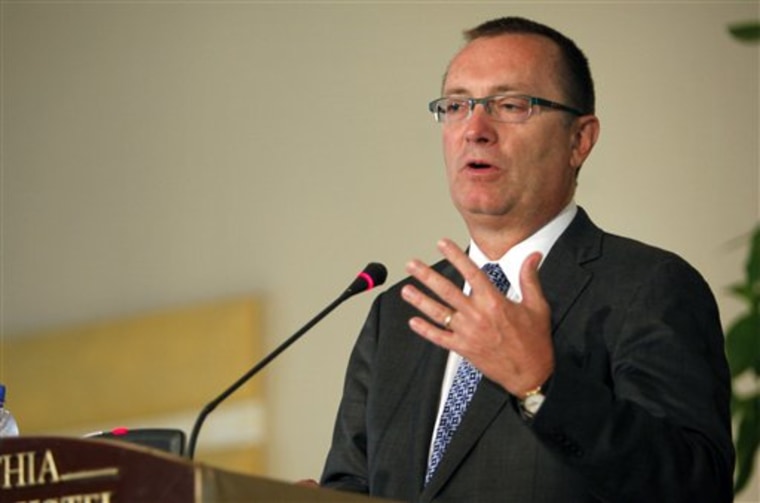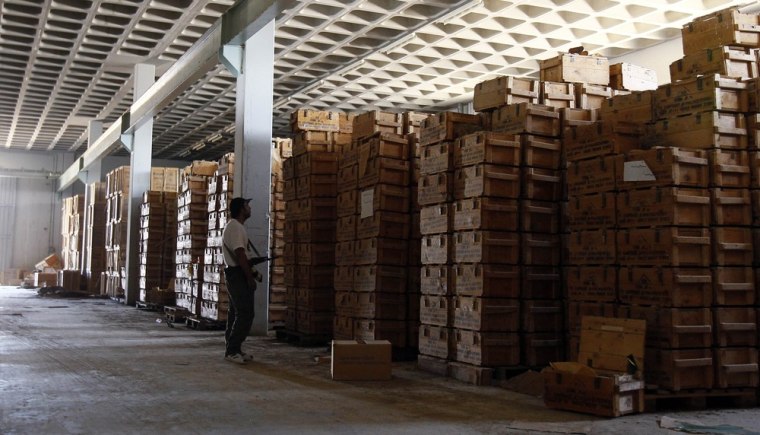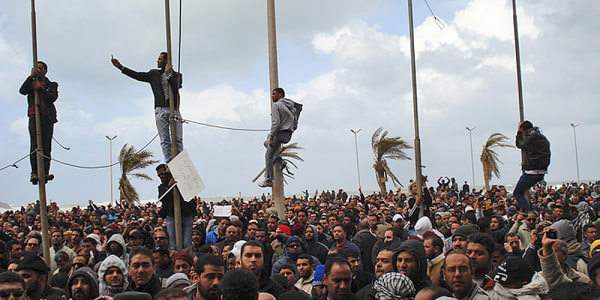The potential proliferation of weapons in Libya after six months of civil war is a "key concern" for the United States, a senior American official said Wednesday.
The conflict that ended Moammar Gadhafi's 42-year rule and sent the former dictator into hiding also threw open the gates to his regime's extensive armories. The country's new leaders, who are struggling to establish a government, have failed to secure many of the weapons caches. Witnesses have watched looters, former rebel fighters or anyone with a truck carry them away.
U.S. Assistant Secretary of State Jeffery Feltman told reporters in Tripoli that Washington already has people working with Libya's new rulers about the possible proliferation of shoulder-fired missiles, as well as dangerous chemicals like mustard gas.
"This is certainly an issue we are concerned with, the Libyan officials are concerned with, because it poses potential risks not only to Libyans, but to the region as a whole," said Feltman, who was in Tripoli for talks with the former rebels' National Transitional Council.
Journalists and human rights groups have discovered huge weapons depots around Tripoli since the former rebels swept into the capital Aug. 21. Many of the sites are poorly guarded and have already been looted of mines, mortars and even shoulder-fired surface-to-air missiles designed to bring down airplanes, helicopters or drones.
The greatest concern, however, is the proliferation of unconventional weapons, such as mustard gas and other chemical agents.

Despite worries about other weapons, Feltman said "to the best of our knowledge" stores of mustard gas "are containerized in bulk form accountable to the OPCW (Organization for the Prohibition of Chemical Weapons), and we believe from monitoring that they are where they are supposed to be."
Last week, the U.N. chief weapons watchdog said Libya's remaining chemical weapon stockpiles are believed to be secure.
Ahmet Uzumcu, director general of the OPCW, said his inspectors left the country in February when the uprising started and will return "when the conditions allow us." He added that he had heard from sources that the "remaining stockpiles of chemical weapons are secured." He did not identify his sources.
In 2004, Gadhafi agreed to dismantle his weapons of mass destruction, and his regime underscored its commitment by using bulldozers to crush 3,300 unloaded bombs that could have been used to deliver chemical weapons.
Slideshow 81 photos
Libya's uprising against Gadhafi
Feltman voiced strong support for the National Transitional Council, the closest thing Libya's new rulers have to a functioning government.
"We remain encouraged by growing command and control over security and police forces," he said. "We understand that this is a difficult task."
Feltman's visit comes as a rebel offensive on Bani Walid, one of three significant remaining loyalist strongholds, has stalled.
Abdel Rahman al-Kazmi, a field commander in Bani Walid for anti-Gadhafi forces, said his fighters are preparing for a new push on the town in the coming days.
"Our strategy is to advance slowly to give a chance to the families to leave," he said. "That way, Gadhafi loyalists will become afraid because the city will be empty and they will have no support."
Many families fleeing Bani Walid have described a worsening situation in they town, saying there is no electricity or water, and shops are running low on food.
The former rebels launched a two-pronged assault on Bani Walid on Friday but have run into fierce resistance from Gadhafi loyalists. Pro-Gadhafi forces have placed snipers on rooftops and used mortars and Grad rockets to hit revolutionary forces.
"The snipers are the worst challenge," al-Kazmi said. "We don't know how many there are."
French President Nicolas Sarkozy and British Prime Minister David Cameron plan to visit Libya on Thursday, AFP reported. It would be the first visit by a foreign head of state since the toppling of Gadhafi.
The two leaders will be accompanied by Bernard-Henri Levy, the French philosopher who championed Libya's revolution and helped convince Sarkozy to back the rebels, several sources in Paris told AFP.
France and Britain spearheaded the NATO air war against Gadhafi's forces.
The French newspaper Le Figaro said the trip could include stops in both Tripoli and Benghazi, the eastern city that was the birthplace of the uprising.
Meanwhile, the International Committee of the Red Cross said Wednesday at least 13 mass graves have been found in Libya over the past three weeks.
The Geneva-based humanitarian agency said its staff assisted in the recovery of 125 bodies found at 12 different sites in and around Tripoli. It said remains of 34 people were also recovered from a site in the Nafusa mountain village of Galaa in western Libya.
ICRC spokesman Steven Anderson said that more mass graves are being found every week.
The aid group says it is helping ensure the remains are properly recovered so that the identities of the dead can be established and relatives informed.
It said it is not involved in collecting evidence that could be used in war crimes or other legal proceedings.

